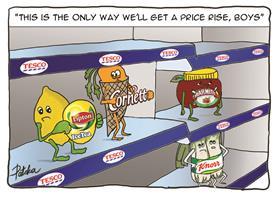
Last week’s Marmite row, which saw Unilever and Tesco go public with their spat over price increases, was seen by many as something of a PR stunt.
It surely wasn’t a coincidence, they suggested, that Tesco’s CEO Dave Lewis is a former Unilever boss, and the dispute was resolved within a matter of days with both brands coming out smelling rosy. Nevertheless, the scenario has brought to fore the very real issue of how UK food importers and retailers will deal with post-Brexit import price rises, as the industry feels the first concrete effects of the UK’s vote to leave the EU.
Will a big supplier coming out and publicly asking for a price increase provide a stronger negotiating platform for produce suppliers to do the same? Or will retailers, in the face of pressure from large FMCG brands, have less margin, and less patience, to deal with requests from non-branded fruit and veg?
As one source puts it: “There are always robust conversations between retailers and suppliers, but there is now a very real cost there. There is a significant shift in food prices, and you’ve also got the cost of fuel, which is moving.”
Reportedly, British wheat farmers are among those who may now be able to command higher prices to compete with import prices – but fruit and veg growers will not be quite so lucky. “There are much clearer seasons in fruit and veg than in wheat, so higher prices are harder to negotiate. I think there is a broader piece for the UK consumer who will have to recognise changes in a post-Brexit Britain,” the source says.
But the NFU’s horticulture and potatoes chair, Ali Capper, believes import price increases will have real opportunity for homegrown crops. “British growers will see this as an opportunity to supply more fruit and veg into our supermarkets. As import prices go up we become more competitive,” she says. “I sense the retailers will want to protect themselves from import volatility and look towards a secure supply from the UK.”
Despite Tesco’s public stance with Unilever, choosing to remove the company’s brands from its website, head of commercial for fresh food, Matt Simister, told FPJ last week: “The reality is that agricultural products go up and down in price and you have to pay the price that the market sets. That’s the economic reality of things.”
That said, Simister did stress the need to shield consumers from price increases caused by currency and other market influencers, as commercial manager for New Zealand exporter Golden Bay Fruit, Patrick Meikle, explains: “The problem is, if retail prices go up it could slow demand.”
Speaking as an exporter to Britain from outside of the EU, Meikle says the latest currency fall could see less fruit sent to the UK from New Zealand next year. “We sell into a lot of places where price is in US dollars, which is reasonably strong. There is a general move away from the UK in New Zealand, where many companies are now focusing on Asian markets. This currency issue may speed up that process,” he says, adding that Golden Bay is one of the exporters that remains more focused on the UK.
Meikle notes that the battle to increase prices may well be fought ahead of the next southern hemisphere topfruit season, by northern hemisphere suppliers who will face the issue first. “If they’ve managed to get increases, that bodes well for us. And I hear that they are managing to get the increases they need,” he adds.
In an interesting parallel with Unilever’s leverage through its brands, Meikle says Pink Lady could have a similar effect for the fruit and veg industry. “The big one that will give us all a steer is Pink Lady. In the northern hemisphere, Pink Lady has a fixed pricing for all suppliers, which is set in euros – if they can agree that increase with retailers, that will help us. If it’s the same price as last year, that’s already a 20 per cent increase,” he says.
Such co-ordinated international pressure, led by a brand, will help to spread Brexit costs evenly along the chain, even if this doesn’t reach point of sale.
Although produce suppliers cannot replicate the kind of high-level price demands made by Unilever and co, having the price conversation out in the open can hardly do any harm. Capper says: “It’s quite helpful for the consumer to understand that coming out of the EU puts us in a position where the exchange rate is a much more volatile beast than it was before.”
As Brexit starts to bite, exchange rate volatility and pricing concerns are only one of many conversations that must be had in the months to come, and a bit of transparency will surely be to the benefit of all.



